These are the families who had the door to asylum slammed shut in their faces
EL PAÍS shares the stories of some of the thousands of migrants left stranded in Mexico after the Trump administration shut down the CBP One application
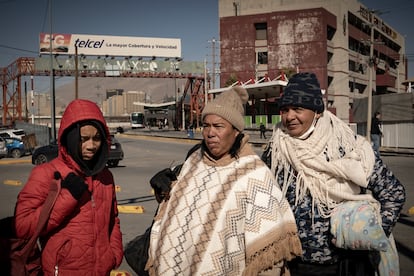
On the afternoon of January 20 in downtown Ciudad Juárez, Sol and Dayane were in tears. They had an appointment in a few short days to request asylum in the United States through the CBP One application, until Donald Trump shut down the system in the first few minutes of his presidency. The action has left thousands of migrants stranded in Mexican territory with no chance of seeking shelter on the other side of the border. Sol and Dayane waited nearly a year for the platform to confirm their appointment. Meanwhile, they cleaned, worked at a printing company and sold candy. They never begged to survive, they insist. The appointment was their reward. For Sol, it was also the chance to reunite with her underage children, who are on the other side of the wall. But from one moment to the next, the future was shattered for thousands of people.
Trump cast migrants as the enemy during his campaign. He has threatened to deport millions and shut down all options of applying for humanitarian visas. At the border, they knew all this would happen, but no one thought it would be so soon. CBP granted 1,450 appointments a day at eight border crossings, from Tijuana to Matamoros. Since the system was installed in 2023, one million migrants had been able to apply for asylum and legally enter the United States. As a result, irregular crossings had plummeted.
Now, as Rodolfo Rubio, researcher at the College of Chihuahua, explains, the elimination of CBP One has left migrants with very few options. The new president has announced that he will bring back the Migrant Protection Protocols program, also known as Remain in Mexico, so that the migrants can wait in Mexico while their applications are processed on the other side of the border. This is slower and more dangerous, and Claudia Sheinbaum’s administration has yet to issue its approval of the plan. “The final scenario is that they end up being a very important market for traffickers of undocumented immigrants. This measure benefits crime,” says Rubio.
In such a panorama of uncertainty and helplessness, EL PAÍS is sharing the stories of those who came so close to a new life.
Jesy and John Palmera: “We’re not going to cross illegally into the United States”

Jesy Palmera enters the soup kitchen run by a religious organization slowly, with caution. He apologizes for his stained hands. He works as a mechanic and managed to get away for a break. He has a January 27 appointment with his brother John to request asylum in the United States and has seen on social media that something has happened to the application, though they have yet to receive any email. “We’re looking for guidance,” he says. They receive confirmation that all appointments have been canceled with profound sadness. They explain that 10 months have passed since they left Portuguesa, Venezuela “with a suitcase, and that’s it.”
The Palmera brothers made the journey to Ciudad Juárez, crossing the Darién Gap and seven countries like everyone who has no money does: on foot. “We only stopped to work, just for the time that was necessary, without losing days,” says 26-year-old John, who is an agricultural engineer but has had to find work in construction and selling furniture. This is how they have been able to stay in Juárez for the last month, and how they imagine they will manage going forward: “We will have to be patient and wait for this man to soften his heart.”
Amid doubts and fear, the Palmera brothers know one thing for sure: “I wouldn’t go there de mojado [without papers]. If that’s how it is, I’m going back,” says John. 31-year-old Jesy adds, “I’m a humble and poor man. I’m healthy, thank God. I don’t think it’s a good idea for me to enter the country that way, because the only good thing I have in this world is my resume and I wouldn’t want to damage it.”
Josué, Margelis and José: “You can’t play with us like that”
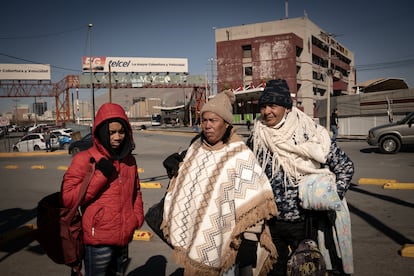
Margelis Tinoco fell to the ground as cameras captured the desperate look on her face. She had just read the notification that the appointment she had to request asylum that very day had been canceled. She held up her confirmation, which she had printed out in color, sobbed hopelessly and then fell silent. There were no words. Along with her husband José Loaiza and their 13-year-old son Josué, she’d arrived early to the El Paso Norte border crossing that connects Juárez to El Paso. Their asylum interview had been scheduled to take place three hours after Trump became president. They didn’t have long to wait. As the new president was still giving his inaugural speech, the application was taken down. “They had us out here shivering since four in the morning, lined up, saying they were going to get us through, and in the end, nothing. You can’t play with a person like that, it’s not humane,” says Loaiza.
Nine years ago, the family left Zulia, on the Venezuelan coast. They worked in the fishing industry, but the country’s economic problems had left them with nearly nothing. They crossed the border to Tibú, Colombia, where they settled down, but the murder of their eldest son displaced them once again, and this time, they went to Bogotá: “We are victims of armed conflict,” says Loaiza. The threats and harassment continued even after the family reached the Colombian capital and, this time numbering one less, they had to set out again.
Once in Mexico, they waited in a Mexico City shelter for their CBP One appointment to be confirmed. They had only recently arrived in Juárez. “We don’t know anyone here,” says Loaiza. “But I don’t want to go, because it could be that these people’s hearts take pity on us. There were only a few of us in line, look, there were about 20 of us. I told the guard to let us go through to our appointment, quickly. But he told me that it was no longer possible.” Just a few hours marked the difference between one future and another.
Caridad Hernández and Jorge Ramos: “We’ve been left without an appointment, without rent, without work, without anything”
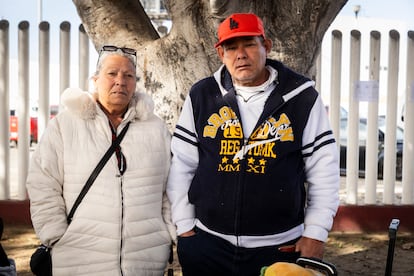
Caridad Hernández didn’t expect Trump’s arrival would interrupt her plans so quickly. “I thought that they would at least respect the appointments that had already been approved and that we would be able to cross,” says the 61-year-old Cuban, who is with her 58-year-old spouse Jorge Ramos, a jovial man who hides behind his sunglasses. The two made the decision nine months ago to sell everything they had in Cuba and set off, like so many before them, on the journey to the United States. They flew to Nicaragua and from there, hired a coyote who helped them cross Central America, and then Mexico. Hernández says they spent $40,000 on the journey. They brought with them their 17-year-old granddaughter Alenays.
The confirmation of their application arrived on January 2, and they were happy. At last, they’d be able to travel north to where the girl’s father lives in Texas. The Cuban family says they stopped for a period in the State of Mexico to work and save a little bit of money. They had to leave everything behind to get to the border. “We’ve been left without an appointment, without rent, without work, without anything,” says Hernández. “Practically how we arrived on this Earth,” responds her husband. Like hundreds of others, the Cubans are stuck at the border. They can’t cross, but neither can they return to the country’s central region.
The CBP One appointment had opened a door for them, but now, they would have to start the application to qualify as refugees in Mexico. It was the last option open to them. “We can’t go back to Cuba, there’s nothing left for us there and it’s possible that we would face political reprisals for leaving,” says Hernández. “You know what hurts me the most? That we always wanted to do things legally, in the best way possible. We never wanted to enter illegally,” she says. Hernández and Ramos have a couple of suitcases and some bags with them, the only possessions they have left. Sad and disoriented, they try to cheer each other up in the face of this new situation. “We have to keep fighting. In the end, we are alive, which is the important thing,” says Ramos. “Only the Lord knows what is going to happen,” says his wife.
Carlos Andrés and María de los Ángeles: “Who wants to stay in a country where they don’t want you?”
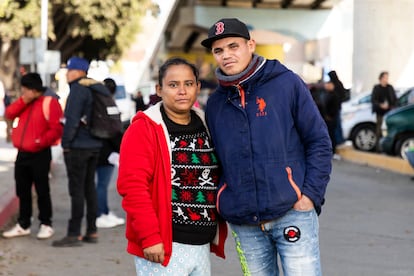
Carlos Andrés and María de los Ángeles have been together for 15 years and have three children. Their kids, they say, are in Colombia. “We left them being taken care of because we were going to cross first and then when we got there, we were going to send for them,” they say. The couple, who are 31 and 38 years old, had an appointment scheduled for January 27. They explain that migrating to the United States was the only way they could escape death threats. “We came thinking we could get away from the violence,” says Andrés. The journey to Mexico was not much better. They flew from Bogotá to Cancún, Mexico, and from there took a bus to the country’s capital, Mexico City. But at some point along the way, the couple says that agents from Mexico’s National Institute of Immigration stole $150 from them. “They told us that if we didn’t pay them, they wouldn’t let us continue on,” says Andrés.
“After Mexico City, we continued our journey up,” continues de los Ángeles. “We got on the train, we walked a lot and we lived in the streets, begging for food.” Then they had to flee from authorities. “They caught us and forced us off the train,” they say. They arrived in Ciudad Juárez and managed to find work for few months until they received confirmation of their appointment 750 miles away in Tijuana, on the Californian border. At last, after so many calamities, they were within sight of their goal — until it all came crashing down. “I don’t know what we will do, we’re desperate,” says Andrés. “I left my children to try to get in,” says de los Ángeles.
They had permission from Mexican authorities to be in the country until Friday. After that, they didn’t know what they would do. Their time in Mexico has been traumatic and after the decision was made to close the border to immigration, it doesn’t seem like things will change any time soon. “Who wants to stay in a country where they don’t want you? We don’t have any choice,” says de los Ángeles.
Zoila Romero: “I sold my house in order to come”
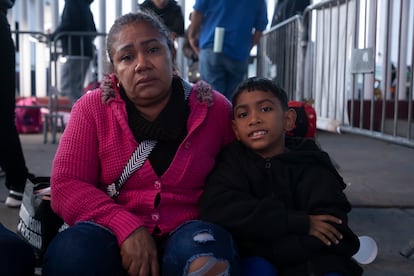
Zoila Romero sold her house in Maracaibo for $2,000 in order to emigrate to the United States. She’s crossed seven countries and has no savings left. She is 51 years old and sits on the sidewalk in front of the El Chaparral border crossing in Tijuana.
Romero cries disconsolately and hugs her eight-year-old son. She is traveling with her spouse and a group of other Venezuelans they met along the way. On January 20, she awoke to the worst news she could have received: the cancelation of all appointments to request asylum in the United States. Trump’s decision to enforce a hardline immigration policy has left her with no chance of crossing the border, but also no option to return home. She no longer has a house to go back to. “It’s a lot of broken dreams. I had hopes of working and reuniting with my daughters who live in Tennessee,” she says, her eyes full of tears.
A few hours after the border closure, everything is uncertain. “If I go back, what can I give my son in Venezuela? I sold everything,” she says. “In my country, there’s no quality of life, no freedom of expression, we can’t think differently than Maduro.” The woman says she left because she couldn’t make ends meet on her salary. “I earned $2 a month,” she says. “What can you do with that? Nothing,” she answers her own question.
Despite everything, Romero says she maintains hope that they will respect her approved appointment at the border. “It’s not fair, we were very close to achieving our dreams and they shut the door in our face,” she says, wiping away tears. The Venezuelan asks U.S. authorities in general and Trump in particular, “to listen to their hearts,” and let them in. “I understand that they do a background check, but we’ve never done anything bad to anyone. We only want to work and give a better life to our children,” she says. Then she repeats her previous sentiment: “It’s not fair, it’s not fair, it’s not fair.”
Translated by Caitlin Donohue.
Sign up for our weekly newsletter to get more English-language news coverage from EL PAÍS USA Edition
Tu suscripción se está usando en otro dispositivo
¿Quieres añadir otro usuario a tu suscripción?
Si continúas leyendo en este dispositivo, no se podrá leer en el otro.
FlechaTu suscripción se está usando en otro dispositivo y solo puedes acceder a EL PAÍS desde un dispositivo a la vez.
Si quieres compartir tu cuenta, cambia tu suscripción a la modalidad Premium, así podrás añadir otro usuario. Cada uno accederá con su propia cuenta de email, lo que os permitirá personalizar vuestra experiencia en EL PAÍS.
¿Tienes una suscripción de empresa? Accede aquí para contratar más cuentas.
En el caso de no saber quién está usando tu cuenta, te recomendamos cambiar tu contraseña aquí.
Si decides continuar compartiendo tu cuenta, este mensaje se mostrará en tu dispositivo y en el de la otra persona que está usando tu cuenta de forma indefinida, afectando a tu experiencia de lectura. Puedes consultar aquí los términos y condiciones de la suscripción digital.








































